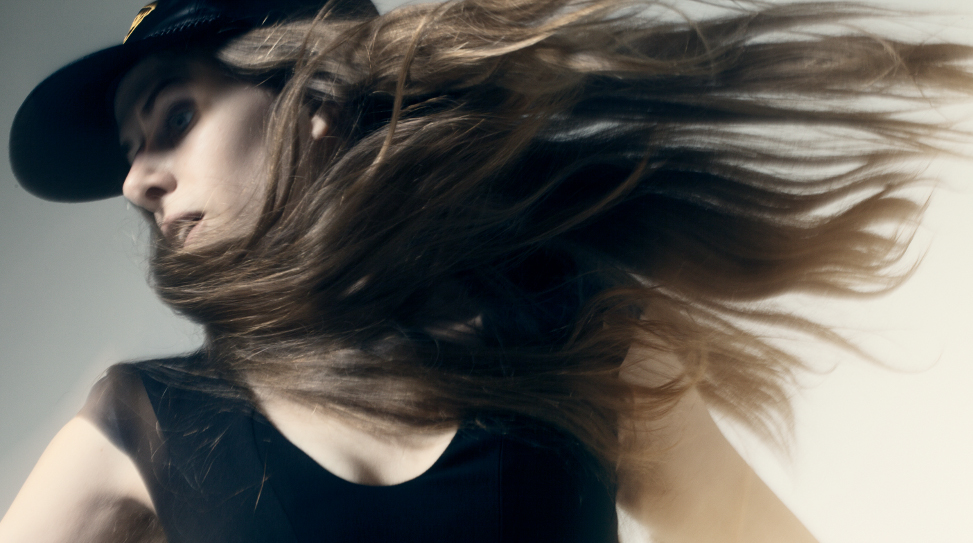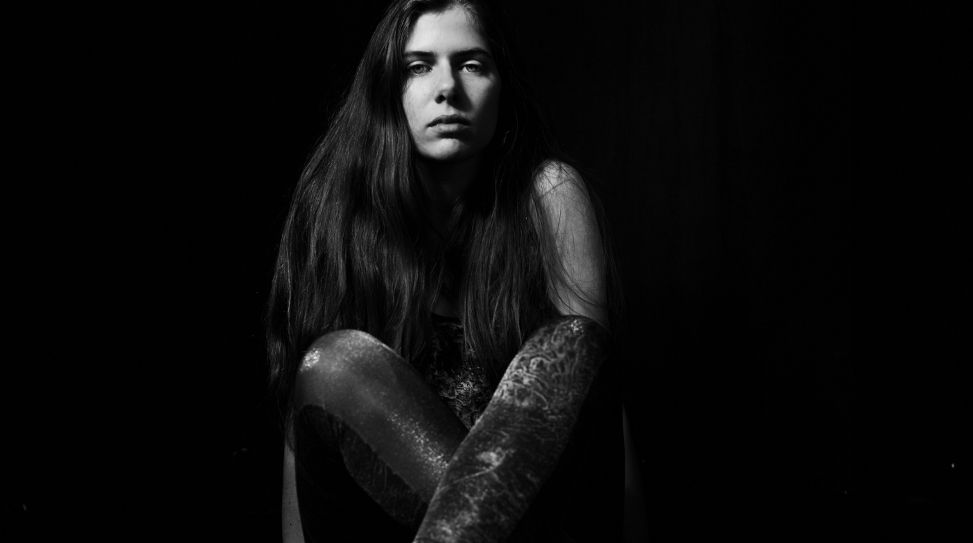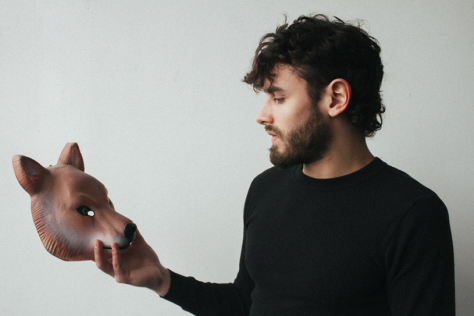Music is the only thing that I really fall into and I just stop thinking. Because I sometimes think too much.
Brooklyn-by-way-of-Michigan artist Laurel Halo has spent the last few years carving out a very particular niche in the electronic music scene. Her body of work, at turns beat-driven and ethereal―but always adventurous―reached new heights on 2011’s critically lauded Hour Logic EP.
Her new album Quarantine takes that record’s icy rhythms and echo-chamber vocals and detonates them. The resulting tracks exist not in a cavern but in outer space, each song comprised of multiple elements whose orbits briefly but repeatedly intersect. Halo’s vocal work on the album is of particular note. Sometimes recalling the inventive heft of Nico circa The Marble Index, her voice can be flat and insistent, pushing hard against a song’s rhythmic structure. At other times she multiplies her voice into a ringing chorus, or strains and distorts it into a robotic hiccup. As a complete album, Quarantine is beautiful and complicated, as well as a significant step forward.
With a drum loop playing quietly in the background, we sat down with Halo at her home/recording studio in Brooklyn to discuss the making of Quarantine, her working habits, and eating Doritos for lunch.
I wanted to start out by talking about the vocals on the new album. I’ve read a few things you’ve said already about this―
[Bursts out laughing]
―is this like a thing?
Yeah, people ask about the vocals.
Do you not want to talk about that?
It’s fine, we can talk about it. [Faux-imperious voice] What is your question?
My real question is if you have any specific things in mind when you when you sit down to record. Do you have something like an “inspiration board,” vocally?
I mean, there are specific singers that I really love, but listening to the vocals you would not necessarily hear them. Like, I love Stevie Wonder, and David Bowie, and Sade, and David Sylvian, and Elizabeth Fraser―and unfortunately nowadays as soon as you put reverb on a vocal someone will say, “Oh, it’s Elizabeth Fraser, it’s Cocteau Twins!” you know? But I don’t necessarily have a frame of reference for the way in which the vocals ended up getting treated. When I was working on the record I didn’t have this specific intention in mind. I just remember getting bored by hearing the vocals washed in reverb or echo, and when I was recording it I just thought they sounded way better if they were just sort of dry, and slicing, and intense in that way. After I finished the record, and I had some time to think about it and listen to it―and it’s crazy because most records I finish I don’t like listening to again. But I keep coming back to Quarantine; I just like listening to it. And it just started to come together, the reasons why. So it was definitely a process of intuition.
In terms of the way you compose the lyrics, is it a similar process? Because some of the lyrics are…I don’t want to say vague, but they could be described as broad, or even cryptic. How do you write lyrics?
Lyrics can be the driving force of making a track, and sometimes they can come after the fact. A lot of the time I’ll have specific phrases that I return to, and I want to elaborate on those. Sometimes I’ll have written or sung a vocal melody, and then I have to tweak the lyrics so that they fit the shape of that. And sometimes vice versa: I’ll change the shape of of a melody to fit the lyric. I like lyrics that are relatable. It can come from so many different places. Like I start with a lyric, or I start with a melody, or I’ll start with a drum pattern, or I’ll start with a sample pattern, or I’ll start with a bass line, or it’ll start with chords on the piano, or a synth lead…I just start jamming and let it go, you know?
So it’s not a very structured process?
There’s no specific alchemical formula, you know?
When you’re recording, are you a workhorse? Are you in the studio 10 hours a day?
Yes. The answer is yes. I’m a workaholic, and I’m very bad at relaxing [laughs]. I’m starting to get better at relaxing. I usually start at 10, 11, 12, and then go until 8, 9, 10. Usually 10 hours a day. Sometimes when I’m really inspired I’ll go and jam and record and mix and shit for 14 hours, and sometimes if I’m not feeling it I’ll work on it for 2 hours and be like “Fuck it,” and then feel like shit for the rest of the day [laughs]. I think in the process of making this record I got better at forgiving myself. I can be very hard on myself, and I’m a perfectionist, and I want to make amazing music. And I think Quarantine is a great record, but it’s not―I have yet to make my timeless records, you know? I’m hopeful that the ‘classic era’ is ahead of me [laughs].
You started playing piano when you were a kid, right?
Yes.
And are you classically trained? Did you go to school for music or for composition?
I went to school for music, and I got nothing out of music school. I hate academic music, I think it’s a steaming pile of bullshit. Well, some of it is steaming bullshit. Some of it is beautiful and transcendent. But I think it’s very problematic to call a certain type of music ‘new music,’ as if nothing else is new. I got more inspiration out of doing Freeform radio. I was really inspired by that, and by going to shows in Ann Arbor and Detroit, and just experiencing live music firsthand, and jamming, and playing in bands and groups. I was in this free improv group at the end of school. That was a really great experience. I was the only violin player, so I kind of got in by default and was playing with all these crazy-talented jazz musicians. We did a show once with Henry Grimes, and that was really amazing. (Henry Grimes being an enigmatic jazz figure who just disappeared from the face of the earth for several years and then just recently resurfaced and is playing shows again.) I felt music deeply growing up, and playing classical music gave me an appreciation of and a love for the technical process.. But the inspiration for the music I make has little to do with classical music specifically. Unless it’s in the context of it being somewhat cinematic.
I feel like a lot of your music is evocative or cinematic in that way. Would you be interested in scoring a film?
I have done it here and there, and I love making music in service to a picture or a story. When someone tells you “this is the story, this is the vibe,” and then you compliment that and play off of it, it’s a really interesting way to work. So I hope to keep making amazing records, and then parlay that into scoring work.
So people have approached you for that?
Yeah, I’ve done bits here and there for friends’ film projects or TV projects, and I’ve been approached about projects in the future as well. Open heart, open mind, you know? I think there’s something about music for film that can be extremely panoramic. Like you were saying, there’s something evocative, something vague. That combination of being majestic or panoramic but also being suggestive and multifaceted. I think that’s really interesting.
It sort of goes back to what you were saying about how you like lyrics that are relatable, that are open to interpretation.
Yeah, lyrics that people can find themselves in. I think when people try to cram too many syllables into some lyrics, the content can get lost on you.
In terms of that feeling, that immersion―is that something that gets reflected in the music? If you have a shitty day, does that become part of the process?
With a couple tracks on the record, it started with a really heavy energy, or dark energy, and wanting to let go of that. Giving it shape, pulling it out of my brain and letting go of it. But I don’t necessarily have to be in a bad mood to make music. I think I have an underlying level of continuous anxiety. I have a monkey mind, where I jump from idea to idea to idea. Music is the only thing that I really fall into and I just stop thinking. Because I sometimes think too much [laughs].
That’s one of the striking things about Quarantine. There are tracks that are dark―or even abrasive―but other tracks are very open and light. The last track is called “Light and Space,” for instance, and it feels that way.
I would say that it’s a dark record, but it’s also hopeful. I like music that makes people feel positive about themselves.
There’s a basis for that in a lot of electronic music―it’s music for dancing, for crowds. It seems like there are elements of that in your music as well.
I love playing live shows, and I love the magic that happens when your music hits a massive PA and subwoofer and there’s this massive, heavy, wild energy, and people just fall into it. But there is also a pretty heavy element of isolation, because I’m working by myself on the music. There’s also a lot of sensory deprivation on the record too, because I kind of cut myself off from the outside world. I didn’t listen to too much music or watch too many movies, and I didn’t go out. It was a pretty aesthetic summer last year. I would be so into the music that instead of getting lunch, I would just run up to the bodega and get an Arizona Iced Tea and Welch’s Fruit Snacks and then a bag of Doritos, and that would be lunch [laughs]. I don’t think I was taking very good care of myself when I was working on the record.
This is kind of on-the-nose, but maybe that’s the “quarantine” of the title.
You know, another interviewer asked me about this, is Quarantine a statement about escaping the outside world. And I definitely…everything kind of melts away when I’m working on music, but I wouldn’t say that it’s a deliberate form of escape. Because I’m a part of the real world, and the real world exists, and music exists in the real world. I think the music is trying to come into conversation with the uglier aspects of the real world, and not separate them. Which is interesting because the record is called Quarantine. I guess thinking about sensory deprivation led to feelings of suffocation and isolation. I had these ideas of disease and illness, and wanting to turn them into something transcendent or positive. I wanted the record [to have] this pressurized air tank sound, where deadly viruses are contained within, or people are protected from [those viruses] in this isolated chamber. But I wouldn’t say the record is about me trying to be safe from disease or be safe from harm. I think it’s more about me addressing them head-on.
And ultimately you’re making music, and that is going to interface with the world, and with other music, and you’ll be touring.
Maybe because I’m a Gemini. There are two of me. There’s the one that likes to be isolated and likes to be in my hermit zone and jamming, and feeling the music, and writing and mixing. And then there’s the other side of me that loves performing and loves playing shows and loves connecting [with people]. So there’s this divide in me, and maybe I have a detached personality in that way. [Legendary Detroit producer] Carl Craig is a famous Gemini, and I’ve read interviews where he talks at great lengths about his Gemini sides. Maybe Geminis make good artists for that reason [laughs].
Sure, like there’s a dual impulse to do two different things. Do you think that has something to do with why you didn’t enjoy music school? That the formal training was isolating in-and-of-itself, almost in an “Ivory Tower” way?
I think that what’s interesting about living here [in New York] is that there are loads of different kinds of artists and musicians, and there’s just this crazy fabric. Whereas academic music can be very focused on tradition, and on classicism. So yes, I think that having grown up and done radio, and exposing myself to lots of different kinds of music, and then moving here and being in this crazy community, it feels more appropriate for music. Because music is not―it is a closed system in that they are finite moments in time, tracks and songs. But the spirit of music is very open-system oriented.
It does seem like electronic music, or music any that you can make alone, is more of an independent entity.
You don’t need to feel tied to a tradition, or even a scene, to make music. I think I’ve been very fortunate to make friends with musicians and gotten inspiration from them, but I’ve never felt that the scene here is what inspired me to make music.
Quarantine is out now on Hyberdub.



 A Conversation with James Paxton
A Conversation with James Paxton Vital Stats: Allan Rayman
Vital Stats: Allan Rayman
1 Comment
the label is hyperdub not hyberdub